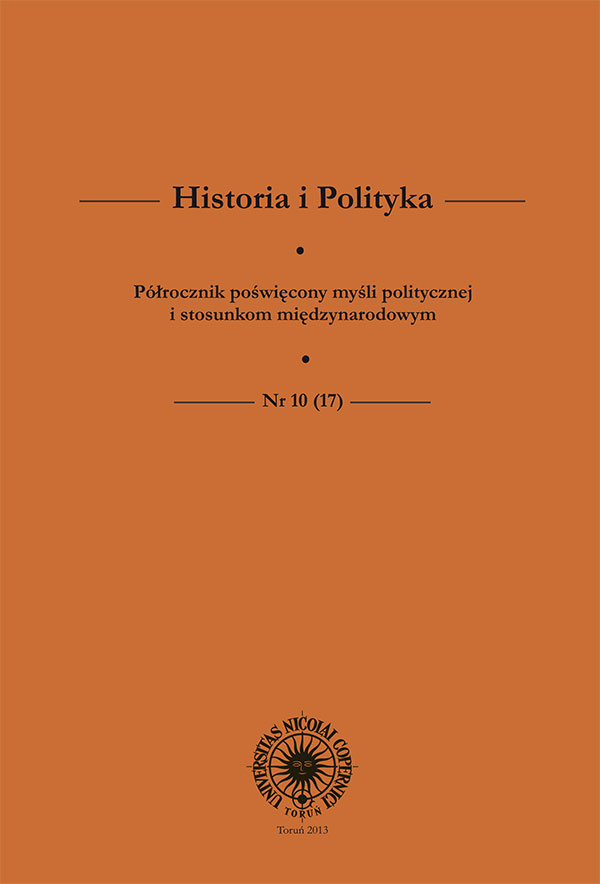Pobyt Aleksandry Kołłontaj w Szwecji i Danii (IX 1914–I 1915)
DOI:
https://doi.org/10.12775/HiP.2013.015Słowa kluczowe
Aleksandra Kołłontaj, Rosja, Szwecja, Dania, propaganda, Alexandra Kollontai, Russia, Sweden, DenmarkAbstrakt
The aim of this article is to present the activites undertaken by Alexandra Kollontai during her stay in Sweden in 1914. Alexandra was a famous socialist activist at the time, and as a consequence of her activity had to flee Russia in 1908. For the following eight years, she remained in exile. She traveled throughout Europe, but collaborated most closely the with German Social Democrats party. After the I World War began, Kollontai – along with her son, Michael – was arrested. Thanks to an intervention of influential German politicians, both of them were released from jail. Shaken, she broke up her ties with the German socialist movement. Alone, Kollontai traveled to Sweden in September 1914, and moved for good to Stockholm. During the sojourn in Sweden, Kollontai was in touch with one of the most prominent local socialist activists, Hjalmar Branting, and took an active part in the Swedish socialist movement. During her short-term stay in Norway, Kollontai was not formally a supporter of the Bolshevik proposition, but she still wrote letters to Lenin. She also had a love affair with a Bolshevik comrade, Alexander Shliapnikov. The Swedish police arrested Kollontai for participation in anti-military propaganda activities. She was exiled from the country in November 1914, to Copenhagen. Also there, Kollontai managed to establish close relationship with the Bolsheviks. Hereafter, she has played a crucial role in the re-opening of the northern smuggling route.
Bibliografia
Andersson I., Dzieje Szwecji, Warszawa 1967, s. 314–315.
Baron S., Plekhanov: The Father of Russian Marxism, Stanford 1963.
Branting H., http://www.nobelprize.org/nobel_prizes/peace/laureates/1921/branting-facts.html
Briesław J., Aleksandra Michałowna Kołłontaj, Moskwa 1974, s. 27, 43.
Clements E., Bolshevik Feminist: The Life of Alexandra Kollontai, Indiana 1979, s. 86.
Dębiec K., Fenomen szwedzkiej Socialdemokraterny, http://www.psz.pl/tekst-2241/Krzysztof-Debiec, Fenomen-szwedzkiejSocialdemokraterny [odczyt z dn. 28.09.2013].
Farnsworth B., Aleksandra Kollontai: Socialism, Feminism, and the Bolshevik Revolution, Stanford 1980, s. 44–45.
Figes O., Taniec Nataszy. Z dziejów kultury rosyjskiej, Warszawa 2007, s. 188.
Futrell M.. Northern Underground. Episodes of Russian Revolutionary Transport and Communications through Scandinavia and Finland. 1863–1917, London 1963, s. 87-88, 94-95.
Gilmour J., Sweden, the Swastika and Stalin. The Swedish Experience in the Second World War, Edinburg 2012, s. 8–9.
Halvorsten C., Revolutionens Ambassadør. Alexandra Kollontay liv og devned (Aarene 1872–1917), Kobenhavn 1946, s. 201-202, 205-209.
Hammarskjöld H., http://www.britannica.com/ EBchecked/topic/253598/Hjalmar-Hammarskjold [odczyt z dn. 10.09.2013].
Hauge K., Alexandra Kollontai – The Scandinavian Period, Minnesota 1971 (nieopublikowany doktorat), s. 24, 29-31.
Höglund Z., http://www.experiencefestival.com/a/Zeth_Hglund_-_Anti-Militarism/ id/5606233 [odczyt z dn. 27.09.2013].
http://www.andalucia.cc/viva/mujer/aavmalag.html#Oyarzabal [odczyt z dn. 15.10.2013].
http://www.hrono.ru/biograf/bio_sh/shljapnikov_ag.php [odczyt z dn. 17.09.2013]
Jeannin P., Histoire de pays Scendinaves, Paris 1956, s. 85–97.
Kersten A., Historia Szwecji, Wrocław 1973, s. 345–349.
Cieślak T., Szwecja. Z Dziejów XIX i XX wieku, Poznań 1969, s. 68–70.
Kiełbasiewicz A., Aleksandra Kołłontaj w Norwegii, „Historia i Polityka” 2009, nr 1, s. 108.
Kołłontaj A., The War and Our Immediate Tasks, [w:] A. Kollontai, Selected Articles and Speeches, New York 1984.
Kołłontaj A., The War and Our Immediate Tasks..., Rysk sympatii för Norska apfapnare, Dalpilen 1915, nr 46, s. 1.
Kołłontaj A.M., „Riewoljucija-wielikja mjatieżnica...” Izbrannoje pisma 1901–1952, Moskwa 1988, s. 113, 115-120.
Kołłontaj A.M., Dipłomaticzieskie Dniewniki. 1922–1940, Moskwa 2001, s. 49.
Kołłontaj A.M., I z moej żyzni i raboty. Wospominaja i Pniewniki, Moskwa 1974, s. 172, 183.
Kołłontaj A.M., Letopis mojej żyzni, Moskwa 2004, s. 5-6, 215–217, 221-222.
Lenin W., Dzieła Wszystkie. Listy sierpień 1914–październik 1917, Warszawa 1989, t. 49, s. 37.
Palencia I de, Alexandra Kollontay, ambassadress from Russia, New York 1947, s. 71.
Pietrow G., A. M. Kołłontaj w gody pierwoj mirowoj wojny, Istoria SSSR 1968, No. 3, s. 93–94.
Porter C., Alexandra Kollontai: The Lonely Struggle of the Woman Who Defied Lenin, New York 1980, s. 176, 185.
Sydow O., http://runeberg.org/nfcg/0740. html [odczyt z dn. 17.09.2013].
Szczepkina-Kupiernik T.S., Dni mojej Żyzni, Moskwa 1950.
Szejnis Z., Put k’ wierszine, Moskwa 1984, s. 35–43.
Trusz M., Ot politiki riewoljucionnoj borby i pobiedam na diplomaticzieskim frontier. Żizniennyj put’ Aleksandry Kołłontaj „ Zołotaja wietw’ dipłomatii Rossii”, Moskwa 2013, s. 58.
Pobrania
Opublikowane
Jak cytować
Numer
Dział
Licencja
Uniwersytet Mikołaja Kopernika w Toruniu respektuje prawo do prywatności i ochrony danych osobowych autorów.
Dane autorów nie są wykorzystywane w celach handlowych i marketingowych. Redaktorzy i recenzenci są zobowiązani do zachowania w poufności wszelkich informacji związanych ze złożonymi do redakcji tekstami.
Autor, zgłaszając swój tekst wyraża zgodę na wszystkie warunki i zapisy umowy licencyjnej (określającej prawa autorskie) z Uniwersytetem Mikołaja Kopernika w Toruniu.
Statystyki
Liczba wyświetleń i pobrań: 535
Liczba cytowań: 0



